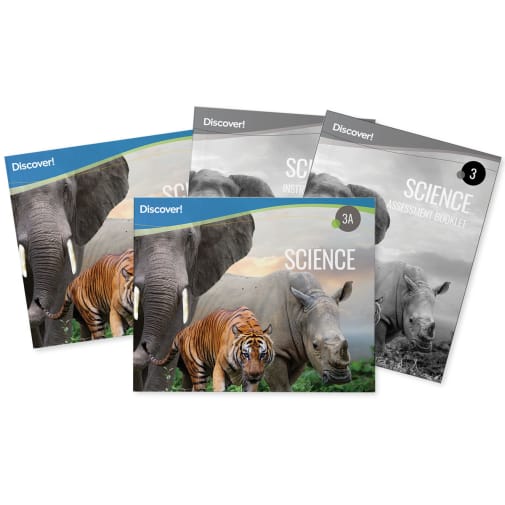Covers scientific method, animal classification, fish, amphibians, reptiles, birds and mammals, behavior and adaptation, plants, ecosystems and the environment, matter, sound, energy and motion, rocks, minerals and soil, weather, and the digestive system.
Discover! Science 3rd Grade Kit
Description
The included instructor guide takes the guesswork out of lesson planning by providing helpful suggestions and answer keys for all activities and assessments.
Student worktexts include activities, instruction, and extensions to appeal to all learning styles. In student worktext A, daily lessons teach students about different types of animals, their behavior and adaptation, plants, and the ecosystem. The student workbook B lessons focus on matter and sound, energy and motion, the environment and weather, and the digestive system.
The assessment book allows students to grow as independent learners. This book provides chapter assessments, covering 5-10 lessons worth of material and rubrics that guide students through the assessments.
This package includes Discover! Science Grade 3 Student Worktext A, Student Worktext B, the Instructor Guide, and the Assessment Booklet.
Designed to teach science in a way that engages the minds of all students, Discover! Science is an exciting curriculum that integrates the neuroscience of learning with research-based instructional strategies. Teaching the 3 branches of Science through visual and textual lessons, hands-on activities, real-life connections, and critical thinking exercises, each grade level connects prior knowledge to new concepts and skills. Along with the branches of Science, the worktexts explain the scientific method and apply it in increasing depth through the grades. Engineering, Technology, and the Application of Sciences are also covered.
Each grade level set includes two Student Worktexts (Semester A and Semester B), the Instructor Guide, and the Assessments Book. Currently, these are only sold in a set–they are not available individually.
With its horizontal presentation, consumable student worktexts begin with an introduction to the worktexts and instructor guides. The guides provide a lesson plan overview and an explanation of the lessons. Lessons are organized topically into chapters and include a review lesson at the end of the chapter. The number of lessons vary by grade (71-78 lessons), with each lesson taking 2-3 days to complete, for a total of 150 lessons per year. Additional enrichment activities are included that encourage students to explore topics more in-depth. Lessons are written to the student and divided into four parts: Lesson Overview, Explore, Direct Instruction, and Show What You Know. In the Lesson Overview, students learn the lesson objectives, vocabulary words to know, and materials for any hands-on activities. Hands-on activities use easily found items. Parents may wish to check lessons ahead of time to have items available. The Explore section encourages students to discover new concepts by introducing the topic and asking reflective or observational type questions. Real life connections are included in many lessons. Reading, reflecting through written responses, and practice is at the heart of the Direct Instruction. Practice focuses on applying what the student has read through hands-on activities which vary from pencil and paper activities like drawing or matching exercises, to hands-on experiments. The final part of each lesson, Show What You Know, has students demonstrate what they learned through fill-in-the-blank and true or false exercises. Additional activities are scattered throughout the lessons and may include artistic assignments like creating a poster, doing real world observations and science investigations, online connections to research the topic (parent supervision recommended), or lesson related game or role playing. Lessons are engagingly written with vibrant photographs and illustrations, plenty of text white space to help readers not be overwhelmed by text, and space to respond to written exercises.
The Instructor Guide is a helpful tool that breaks down each lesson into objectives, offers numerous suggestions to support learning, ideas to teach the different learning styles, and extension activities. Answer keys to all lesson questions are also included. Assessments are found in the Instructor Guide as well as the separate Assessment Book. Chapter assessments at all grade levels cover 5-10 lessons. In Grades 1-2 students are asked to complete a project or a task to assess their understanding with an alternative assessment provided that includes true/false, multiple choice, and short answer questions. Assessments in Grades 3-6 provide a more traditional evaluation of mastery with true/false, multiple choice, and short answer questions. An alternative assessment for Grades 3-6 is included that asks students to complete a project or task to assess their understanding of material. Answers to the Assessments and Grading Rubrics are found in the Instructor’s Guide.
Meeting the learning needs of all 21st century students, this well-organized curriculum will engage science passionate and science resistant learners. I applaud the publisher's effort to design a science curriculum that is comprehensive, with enrichment activities that are effective and homeschool friendly. See individual grade levels for topics covered.
| Product Format: | Other |
|---|---|
| Grade: | 3 |
| Brand: | Discover! |

